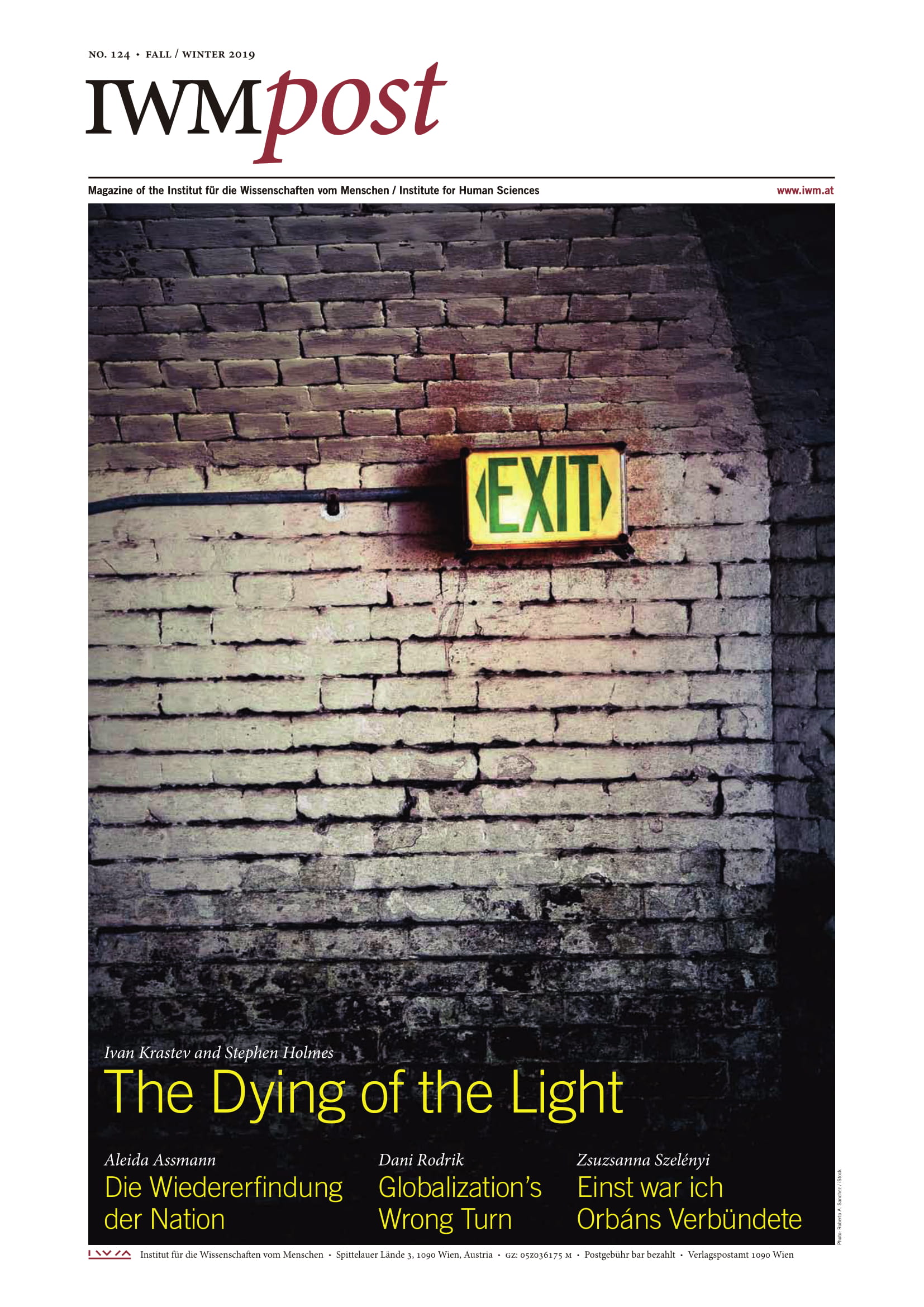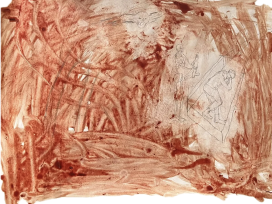Made in a dream factory
Volodymyr Zelensky’s rise to power in Ukraine has left many observers confused. An influential cultural operative for decades, he has been written off as a clown, despite strong popular support and his rapid first reforms suggesting otherwise. Now the task for the Zelensky team is to deliver on the high hopes they have built their campaign on.
This past summer, on a rooftop electronic billboard in central Kyiv, a text lit up on a green background: ‘Welcome to a new era.’ This was the final salvo in Volodymyr Zelensky’s unorthodox presidential campaign. Blindingly bright, the words on the screen burst into our political reality and instantaneously wiped away the towering figure of Petro Poroshenko, who had by then managed to fully inhabit the role of ‘father of the nation’ and representative of the ‘holy trinity’ — army, language, and faith, his own electoral slogan. Along with him, as if by magic, vanished the militaristic pathos and nationalist exclusivity that had formed the ruling consensus among Ukrainian authorities and media during the war.
Over the past six years, some things have become completely normalized: both war and painful counterrevolution, as well as Ukrainians’ extreme precarity, when not just the quality of existence, but the very fact of existence had become vulnerable. The notions of patriotism, nationalism and right-wing extremism fatally intermingled against a backdrop of media self-censorship and intellectuals’ silent refusal to take a critical stance. To be sure, reactionary tendencies during wartime are nothing new, nor is the way that war, like a giant black cloud, covers over not only freedom of thought, but corrupt abuses of power. We found ourselves caught in the wind between counterrevolution and war, and we got carried away by this ‘green wave’ — as many observers have described the political changes that began when Zelensky came to power.
Servant of the People
His victory in the presidential elections was called an ‘electoral revolution.’ And it did offer a link back to 2014, to a point right after the Maidan when, counter to huge expectations, a full reboot of the ruling regime didn’t actually take place. What happened was something else: a group of people from the entertainment industry decided to act out a fantasy of popular sovereignty, a true revolutionary reformatting of politics, on screen. Inspired by the Maidan, they wrote a TV series, ‘Servant of the People,’ in which an ordinary history teacher becomes president of Ukraine. The role of the president was played by Volodymyr Zelensky. And while the authorities at the time saw Ukraine as a sort of big business with citizen employees, the ‘shadow’ authorities, themselves still not fully conscious of their future, built up their forces in a dream factory.
From the very beginning of 2019, we watched as the impossible gradually became inevitable. For the first time, the cultural sphere did not trail the official discourse but instead started to shape it. One of the pretenders to the highest office in the land was a mass culture operative, the darling of all the country’s screens, a top media manager. In shock, the snobbish intelligentsia described him as a comic, a clown, or a comedian. While Zelensky comfortably left all the other presidential candidates in the dust, the cultural elite fell into a xenophobic panic, ‘othering’ Zelensky’s supporters as a manipulated unintelligent mass, incapable of critical thinking, or simply infantilizing them.
This time an unlearned lesson from Pierre Bourdieu’s reflexive sociology made itself strongly felt in the intellectual sphere: Bourdieu described intellectuals as a lower rung of the upper class, who work mainly to preserve their own position, rather than subverting the systems oppressing the lower classes. Losing their privileges (or maybe illusions of their own symbolic weight), representatives of the cultural elite have externalized their own little private apocalypse and are now sitting in wait for these new authorities to experience a total fiasco. Today it is clear that the authors of progressive political discourse are not the intellectuals, but the writers of mass-market comedies.
A new type of leader
This political discourse has found space to address integration, peace, returning people and territories, unity and solidarity, inclusivity, multilingualism and multiculturalism, and ultimately how to build the future. Zelensky himself is an example of a type of leader that is new for Ukraine: before us stands not a post-Soviet neo-feudalist in a tie, but a pathosless team leader. It is worth noting that what used to be his creative team took shape a full two decades ago and has managed to shift almost seamlessly to its new task.
Zelensky made his entrance into politics in the fashion of Luis Buñuel’s film That Obscure Object of Desire, in which the role of the desired female character was played by several actresses at once. For each political talk show booking, one of his team members turned up and spoke in Zelensky’s name. This ‘Buñuelian’ strategy turned him into an alarming object, which drives the Ukrainian — and not only Ukrainian — media crazy. He was called a pig in a poke; there were endless discussions about his lack of a political program and to this day he is still accused of lacking a vision or a long-term strategy.
The green wave he unleashed is moving too quickly. Zelensky wants to amaze people — which his October 2019 record marathon press conference alone did, officially lasting fourteen hours. Experts, political scientists, and journalists cannot keep up with him, axiously forced to reexamine their analytical apparatus to see to what extent he responds to the challenges of a ‘new era.’ Meanwhile the president is condensing time and demanding huge results from all these newcomer politicians. He repeats over and over that time has already been lost, that they need to pick up the pace. It is this acceleration that makes it possible to see the end of the war on the horizon — the most difficult goal the new president has set.
New perspectives
Working professionally in an attention economy, Zelensky is trying to counteract the international consensus of a ‘Ukraine fatigue’ and construct at least some sort of agency for the country, given all its lamentable starting positions. The first moment of agency was the prisoner swap in September 2019, bringing home sailors illegally captured by Russia in the Kerch Strait incident and some of the ‘Kremlin prisoners,’ political prisoners from Crimea and elsewhere being held by Moscow on trumped-up charges. This may have been the first time it has been publicly proven that it is worth fighting for people, that they are the priority under any circumstances. For a country that has now spent six years existing in a death economy and has grown accustomed to being the victim, this is a truly new perspective. Just like the declaration that peace is necessary: we are no longer waiting for someone else to bring peace, and the time has come to take our own steps.
At the same time, the figure of Zelensky has shed light on the unsettling state of affairs in Ukraine’s political sphere: the present ‘party of war’ counts among its members not only the former president and far-right groups, but also members of civil society, journalists, and intellectuals. Meanwhile the majority — which the polls show supports Zelensky — still lacks the language and public channels to shape a discourse of return and renewal.
In today’s Ukraine, hopes are intense and cautious. For example, the hope in ending the era of oligarchic feudalism following a radical overhaul of all branches of power. Still, one important temporal shift can definitely be confirmed: the return home of director Oleg Sentsov, whose release was the most incredible of all. So the dream factory continues to run, while Zelensky looks like the realest and most accessible Ukrainian politician. The history teacher has already taught us a lesson: for the post-Maidan spring to arrive, we have to imagine it first.

This article was first published in IWMpost No. 124, Fall-Winter 2019.
Published 10 December 2019
Original in English
First published by IWMpost No. 124. Fall/Winter 2019
Contributed by IWMpost © Kataryna Mischchenko / IWMpost / Eurozine
PDF/PRINTIn collaboration with
In focal points
Newsletter
Subscribe to know what’s worth thinking about.
Related Articles

For those who suffered the consequences of Yalta’s division of Europe, the Helsinki Final Act brought grounds for optimism. Today, as Russia’s regressive war on Ukraine reopens old conflicts, it stands as a monument to European modernity.

Artist Marharyta Polovinko’s creativity persisted in a tormented form through her experiences as a soldier on the Ukrainian frontline. The words of a recently called-up fellow creative and young family man provide a stark reminder that the Ukrainian military is buying Europeans time.






